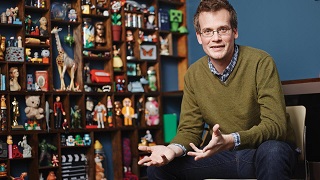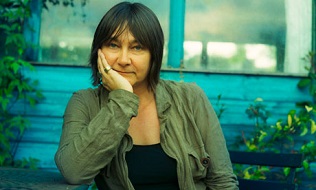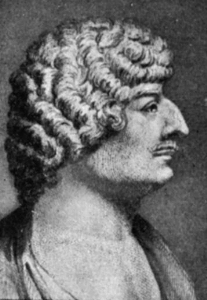De Amerikaanse schrijver John Green werd geboren in Indianapolis, Indiana, op 24 augustus 1977. Zie ook alle tags voor John Green op dit blog.
Uit:The Fault in Our Stars
“Late in the winter of my seventeenth year, my mother decided I was depressed, presumably because I rarely left the house, spent quite a lot of time in bed, read the same book over and over, ate infrequently, and devoted quite a bit of my abundant free time to thinking about death.
Whenever you read a cancer booklet or website or whatever, they always list depression among the side effects of cancer. But, in fact, depression is not a side effect of cancer. Depression is a side effect of dying. (Cancer is also a side effect of dying. Almost everything is, really.) But my mom believed I required treatment, so she took me to see my Regular Doctor Jim, who agreed that I was veritably swimming in a paralyzing and totally clinical depression, and that therefore my meds should be adjusted and also I should attend a weekly Support Group.
This Support Group featured a rotating cast of characters in various states of tumor-driven unwellness. Why did the cast rotate? A side effect of dying.
The Support Group, of course, was depressing as hell. It met every Wednesday in the basement of a stone-walled Episcopal church shaped like a cross. We all sat in a circle right in the middle of the cross, where the two boards would have met, where the heart of Jesus would have been.
I noticed this because Patrick, the Support Group Leader and only person over eighteen in the room, talked about the heart of Jesus every freaking meeting, all about how we, as young cancer survivors, were sitting right in Christ’s very sacred heart and whatever.
So here’s how it went in God’s heart: The six or seven or ten of us walked/wheeled in, grazed at a decrepit selection of cookies and lemonade, sat down in the Circle of Trust, and listened to Patrick recount for the thousandth time his depressingly miserable life story—how he had cancer in his balls and they thought he was going to die but he didn’t die and now here he is, a full-grown adult in a church basement in the 137th nicest city in America, divorced, addicted to video games, mostly friendless, eking out a meager living by exploiting his cancertastic past, slowly working his way toward a master’s degree that will not improve his career prospects, waiting, as we all do, for the sword of Damocles to give him the relief that he escaped lo those many years ago when cancer took both of his nuts but spared what only the most generous soul would call his life.
AND YOU TOO MIGHT BE SO LUCKY!
Then we introduced ourselves: Name. Age. Diagnosis. And how we’re doing today. I’m Hazel, I’d say when they’d get to me. Sixteen. Thyroid originally but with an impressive and long-settled satellite colony in my lungs. And I’m doing okay.”

John Green (Indianapolis, 24 augustus 1977)


